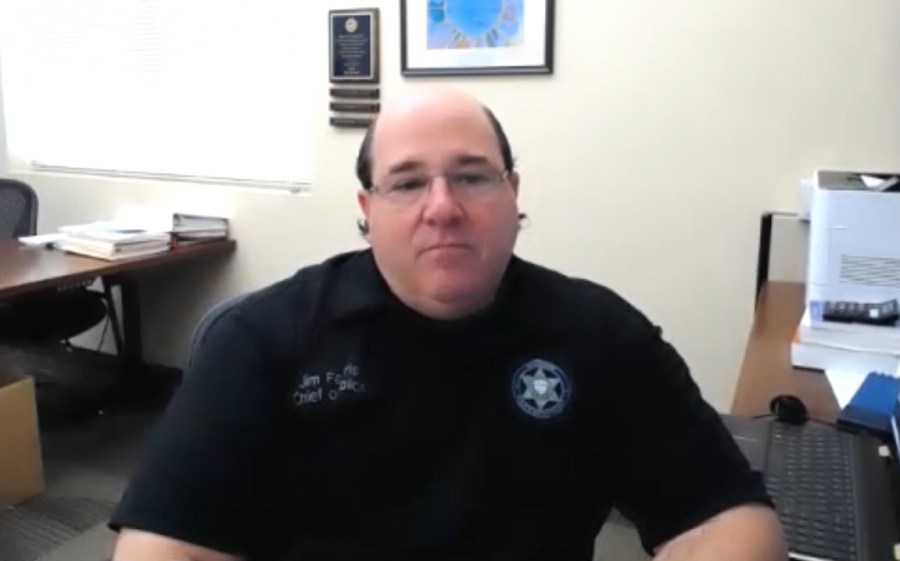CLACKAMAS COUNTY, Ore. (KOIN) — Police, district attorneys and other criminal justice agencies have finished building a policy framework ahead of Oregon’s first-in-the-nation drug decriminalization measure that takes effect next week, but say there are still so many unknowns that implementation will largely be “trial and error.”
“I really have not seen anything that impacts my work as widely as this measure over the decades that I’ve been in law enforcement in Oregon,” Woodburn Police Chief Jim Ferraris told KOIN 6 News. “Even marijuana legalization didn’t come close. This measure impacts so many different facets of the criminal justice system.”
Voters passed Measure 110 in November. It reclassifies personal drug possession to a Class E violation with a maximum $100 fine. People caught with user-amounts of drugs could get the fine waived by completing a health assessment, during which they could be connected with treatment, recovery and housing services — though there is no criminal penalty for failing to pay the fine. Those services would also be expanded under Measure 110 and funded with a large chunk of marijuana tax revenue.
It takes effect February 1, but the Multnomah County District Attorney adopted the measure in December. A spokesperson for the Portland Police Bureau said officers have already switched to issuing citations instead of making arrests. Other agencies, though, are still working through the logistics.
Ferraris is president of the Oregon Association Chiefs of Police, which formed a statewide workgroup with other agencies like the Oregon Youth Authority, State Sheriff’s Association, District Attorneys Association and more to figure out how to adapt to Measure 110.

Moving forward, people in possession of drugs will receive a civil citation and, because drugs are still illegal, police can seize the contraband. Defendants will have to go to court and decide whether to pay the fine or go through a health screening and get the fee waived, Ferraris said.
“There’s no criminal sanction to it,” he added. “It’s essentially less onerous than a traffic ticket.”
Juvenile drug use is of particular concern, since judges can no longer order treatment.
“A 17-year-old can have a bag of meth in his or her pocket and mom and dad will never know,” Ferraris said. “It’s handled like a traffic ticket. Appear in court, pay the $100 fine and off you go.”
The workgroup collaborated with juvenile departments around the state to try to convince them to intervene at a youth’s first court appearance and direct them or their guardian to services so they “don’t fall through the cracks,” Ferraris added.
However, the notion that parents wouldn’t have been informed is hotly contested by lawyer and former U.S. Attorney for Oregon Amanda Marshall, who called such statements “fear mongering.”
“Whether or not a police officer would inform a parent that they encountered a child in possession of controlled substances or anything else that’s dangerous is within the discretion of the police officer,” Marshall said, adding that nothing in Measure 110 changes that.
“I wouldn’t think that we would need to tell a police officer that if you find a kid with a bag of meth on the street that you should call his parents,” she said. “That just almost seems ridiculous to me.”
At least in the Multnomah County Sheriff’s Office, it is standard practice for parents to be notified any time a teen is cited or arrested, a spokesperson for the department said.
The changes only apply to drug possession on February 1 and beyond, so if someone has been using illegal drugs in January, prosecutors could still charge and try them for that after the law officially takes effect.
Guidance from the Oregon Department of Justice (DOJ) outlines the amount of drugs that exceeds personal use limits. For example, 1 gram or more of heroin, 2 grams or more of meth or cocaine, and 40 or more oxycodone pills. The DOJ also sent a bulletin to law enforcement agencies with information about how searches and seizures will be impacted by the measure.
But there are many unknowns, from what happens if you refuse to pay the fine to whether or not the funding portion of the measure will come through this year.
Governor Kate Brown’s proposed budget invests $112.6 million to implement Measure 110, a number far larger than the minimum $57 million a year in funding the text of the measure called for. However, Brown proposes delaying the financial portions of the measure until July 1, 2022 due to the challenging economic times brought on largely by the coronavirus pandemic.
“Tackling Oregon’s addiction crisis is not something that can be put on the back burner until after COVID-19, and addressing it should be considered part of our state’s pandemic response,” Devon Downeysmith of the Oregon Health Justice Recovery Alliance wrote in a statement to KOIN 6 News.
Overdose deaths spiked 40% last year, according to the Oregon Health Authority. Experts say addiction thrives when people are isolated.
“The Legislature has a duty to honor voters’ wishes and invest in the recovery services outlined in Measure 110 now,” Downeysmith wrote, adding that supporters of the measure are continuing “discussions” with legislators.
If the delay is adopted, Ferrais said, “We may be citing people for this violation and they go to court but there’s no mechanism for this health screening to take place because there’s no funding for it.”
Leaders won’t have all the answers come February 1, but Ferraris said they’ll continue to collect data on the number of seizures, whether fines are being paid or if people opt for the health screenings. Agencies may ask the legislature to address areas where they see “opportunities for improvement,” he said.
“We really are going to have to work through it from a trial and error standpoint,” he said. “We’re trying to get on the front end of it with good policy and good training to prepare our people to handle this, because this is a huge paradigm shift for law enforcement in Oregon.”